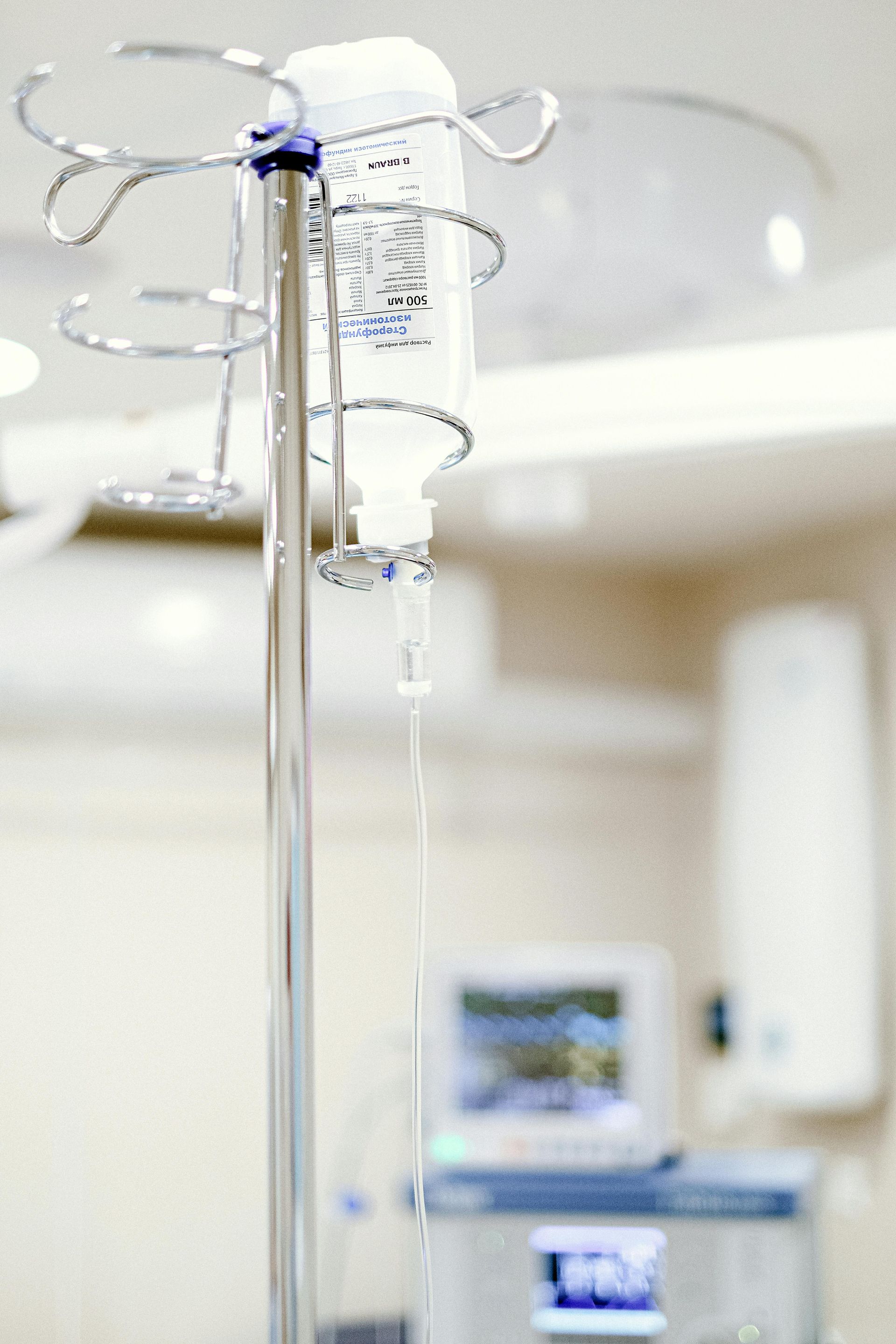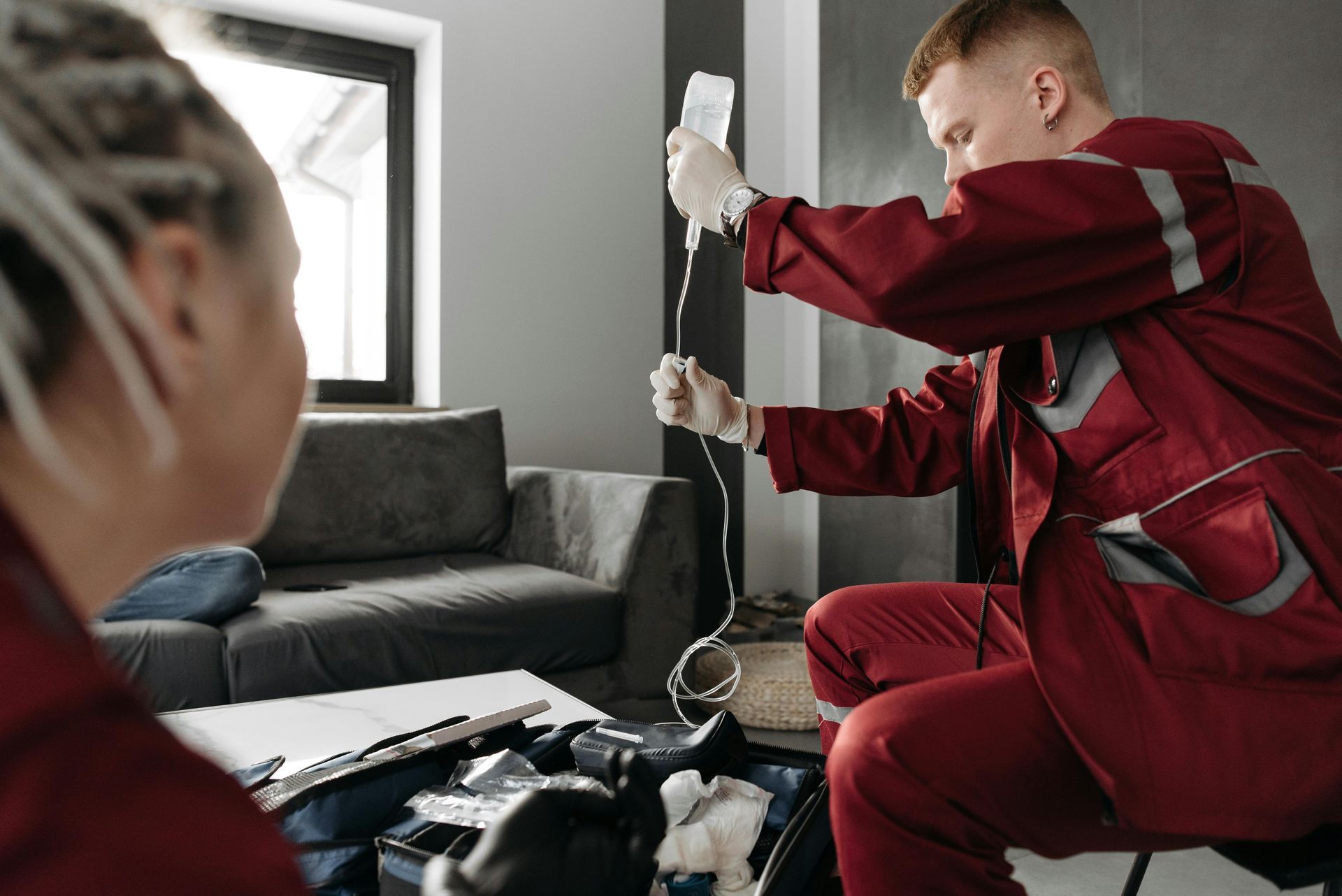Beginner's Guide to IV Hydration: What You Need to Know

Medically reviewed by Micaela Strevay, FNP-C, PMHNP-BC
Table of Contents
What is IV Hydration and How Does It Work?
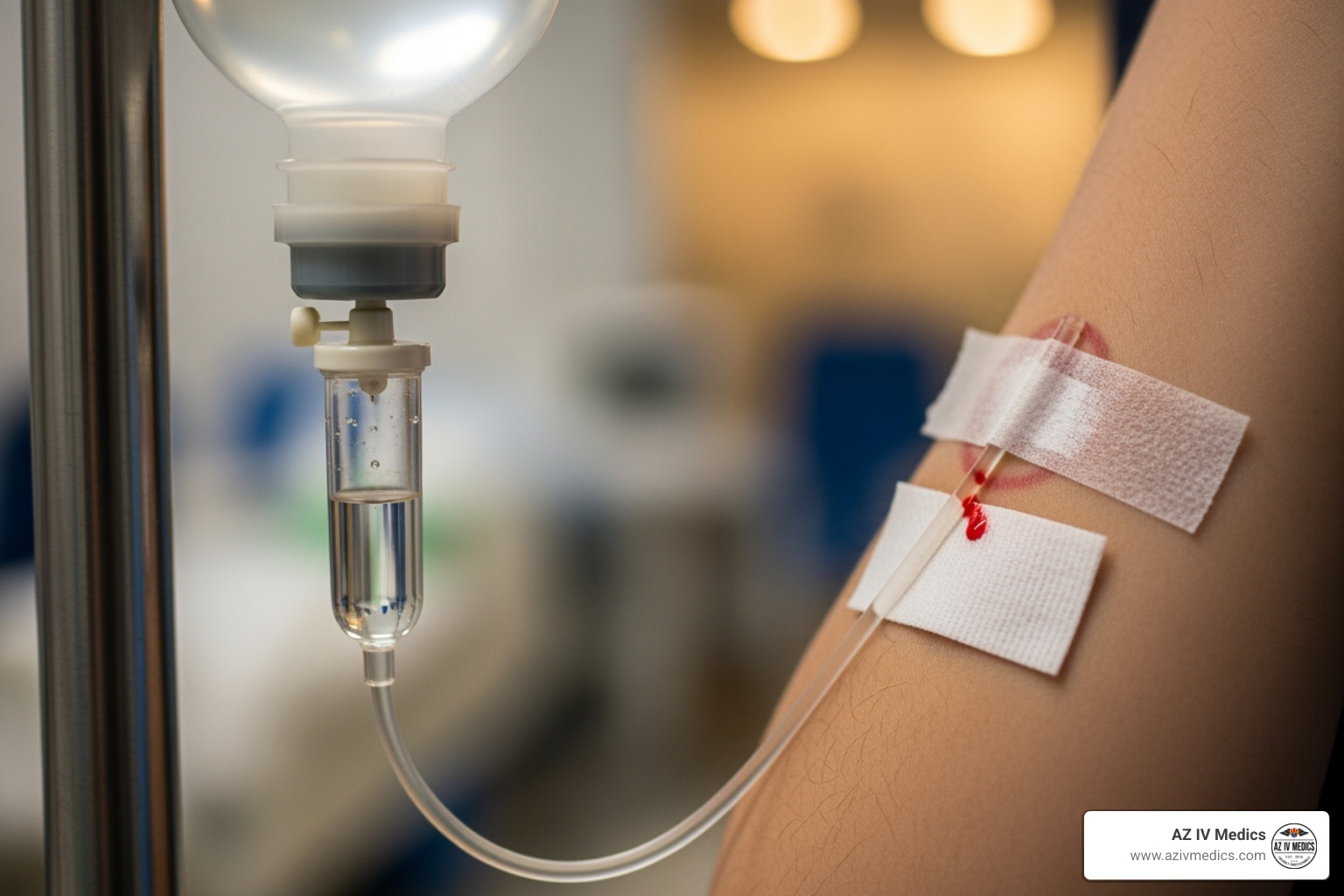
IV hydration is a medical treatment that delivers fluids, electrolytes, and vitamins directly into your bloodstream. By bypassing the digestive system, this method allows for 100% absorption of nutrients, compared to only about 50% when taken orally. This means you get faster, more effective results.
Key benefits of IV hydration:
- Direct Delivery : Nutrients go straight into your bloodstream for immediate use.
- Fast Absorption : Effects are felt in minutes, not hours.
- High Bioavailability : Your body absorbs 100% of the nutrients.
- Customizable Treatments : Drips can be custom with specific vitamins and minerals.
Originally a hospital treatment for severe dehydration, IV hydration is now widely available through mobile services for wellness purposes like hangover relief, athletic recovery, and fatigue. The process is simple: a medical professional inserts a small catheter into a vein in your arm, connecting it to a sterile IV bag. The fluid mixture then drips directly into your system over 30-60 minutes.
About the Author
I'm Joseph Lopez from AZ IV Medics. I've helped thousands of Arizona residents experience the benefits of professional, mobile IV hydration therapy. My background in patient care has shown me how this treatment can significantly improve well-being and recovery.
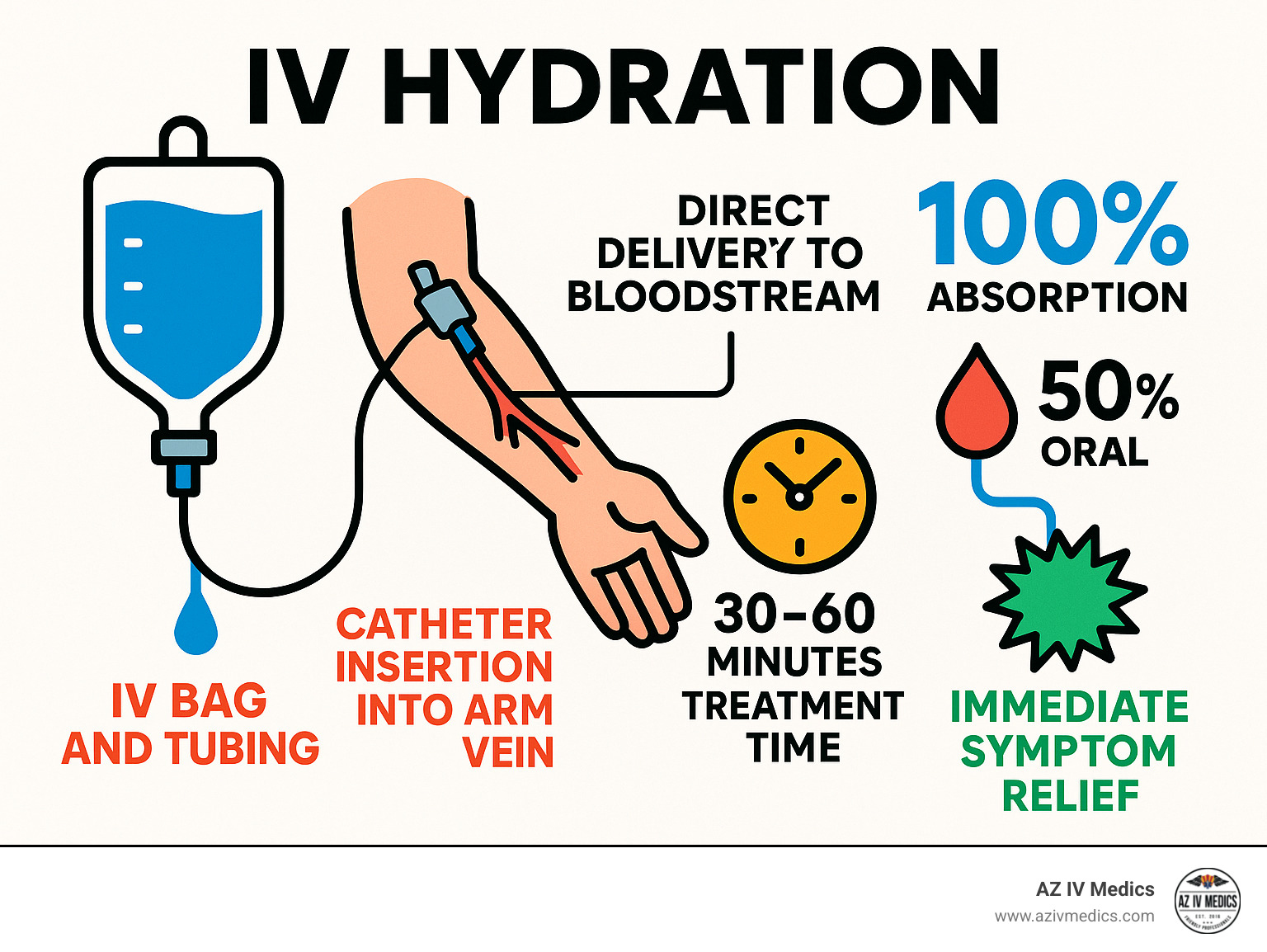
Iv hydration terms explained:
The Science Behind the Drip: How IV Hydration Works
Why does IV hydration feel more effective than drinking water? The science is simple. When you drink fluids, they travel through your digestive system, where absorption is slow and incomplete. Much of what you consume is lost before it reaches your bloodstream.
IV hydration bypasses the digestive system, delivering fluids and nutrients directly into your veins. This allows for nearly 100% absorption, compared to just 20-50% from oral intake. Your body can only absorb about one liter of water per hour through digestion, meaning it could take hours to rehydrate from severe dehydration. With an IV, you can be fully rehydrated in under an hour, which is why IV hydration works better than drinking water for rapid recovery.
The IV Administration Process Explained
The IV hydration process is straightforward and comfortable when performed by a qualified medical professional, like a registered nurse.
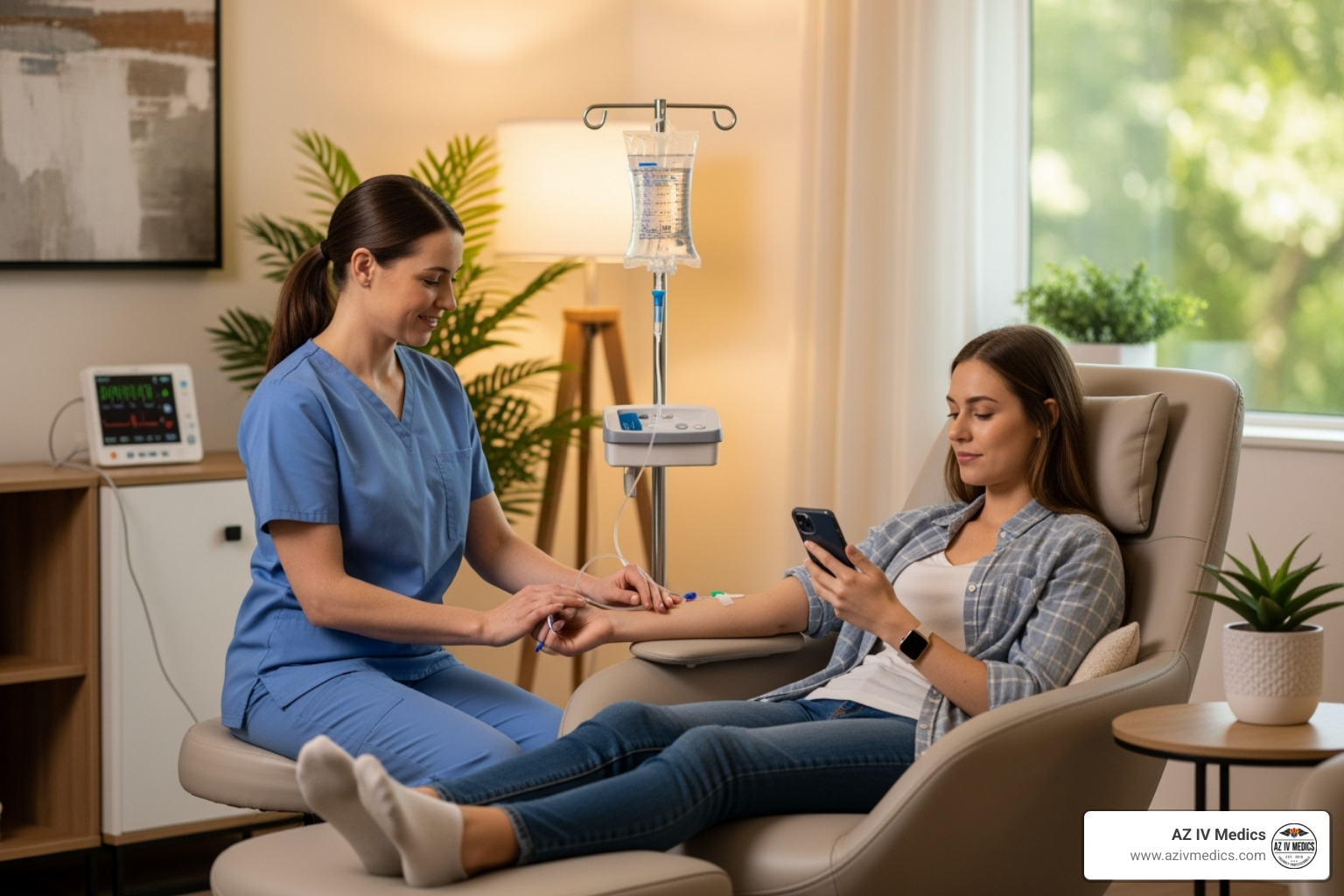
Here’s what to expect:
- Assessment : Your nurse will review your needs and explain the treatment.
- Preparation : Using sterile equipment, the nurse will clean an area on your arm and select a vein.
- Insertion : A small, flexible catheter is inserted into the vein. The needle used for guidance is immediately removed, leaving only the soft tube.
- Infusion : The catheter is connected to the IV bag, and the nurse controls the drip rate for a steady, comfortable infusion. The process takes 30-60 minutes, during which you can relax, read, or work.
- Completion : Once the bag is empty, the catheter is removed, and a small bandage is applied.
For more details, see our detailed guide to hydration therapy: benefits and how it works.
Types of IV Fluids: Crystalloids and Colloids
The base solution for IV hydration falls into two main categories: crystalloids and colloids.
Crystalloid solutions are the most common for wellness IVs. They contain small molecules that move easily from the bloodstream into your body's cells and tissues, providing rapid, full-body rehydration. Common examples include:
- Normal Saline : A mixture of salt and water that matches your blood's concentration, ideal for general rehydration.
- Lactated Ringer's : A balanced solution with electrolytes like sodium, potassium, and calcium, great for more significant fluid replacement.
- Dextrose in Water (D5W) : Provides hydration along with sugar for a quick energy boost.
Colloid solutions contain larger molecules that stay in the blood vessels longer. They are typically used in specific medical settings, like hospitals, to manage blood volume and are not common in wellness IV therapy.
| Type | Molecular Size | Common Examples | Primary Use |
|---|---|---|---|
| Crystalloid | Small | Normal Saline, Lactated Ringer's, D5W | General rehydration, electrolyte replenishment |
| Colloid | Large | Albumin, Hetastarch | Plasma volume expansion, maintaining blood pressure |
Crystalloids are the go-to for wellness IV hydration because they are safe and effective for quick rehydration. Learn more in our guide to IV fluids explained: what you need to know about drips for dehydration.
The Role of Electrolytes and Vitamins in IV Hydration
The true power of IV hydration comes from adding essential electrolytes and vitamins to the base fluid.
Electrolytes are minerals crucial for nerve and muscle function, fluid balance, and heart rhythm. Dehydration from exercise, illness, or alcohol can deplete them. IV therapy replenishes key electrolytes like:
- Sodium : Regulates fluid balance.
- Potassium : Supports muscle and heart function.
- Calcium : Important for bones and muscles.
- Magnesium : Involved in over 300 bodily reactions, including energy and nerve function.
Vitamins are also vital. Water-soluble vitamins like B-vitamins and Vitamin C are perfect for IV delivery.
- B-Vitamin Complex : Known as the "energy vitamins," they help combat fatigue and brain fog by supporting metabolism.
- Vitamin C : A powerful antioxidant that boosts the immune system and promotes healthy skin.
Popular blends like the Myers' Cocktail and the Banana Bag combine these nutrients for targeted benefits. Delivering them via IV ensures your body gets exactly what it needs, right when it needs it. Learn more about the importance of electrolytes in IV therapy for hydration.
Medical vs. Wellness IV Hydration: When Is It Used?
IV hydration serves two main purposes: critical medical care and elective wellness boosts. While the method of direct bloodstream delivery is the same, the reasons for getting an IV vary greatly.
In hospitals, IV therapy is a cornerstone of care for delivering fluids and medications quickly. More recently, its use has expanded into the wellness space through mobile IV services and "drip bars." These services focus on improving general well-being, athletic recovery, and relief from common issues like hangovers. To see how fast it works, check out Dehydration Signs: How IV Therapy Rehydrates Fast.
Medically Necessary IV Therapy
In a clinical setting, IV hydration is a critical intervention used when patients cannot take fluids or medications orally, or when a condition requires immediate absorption.
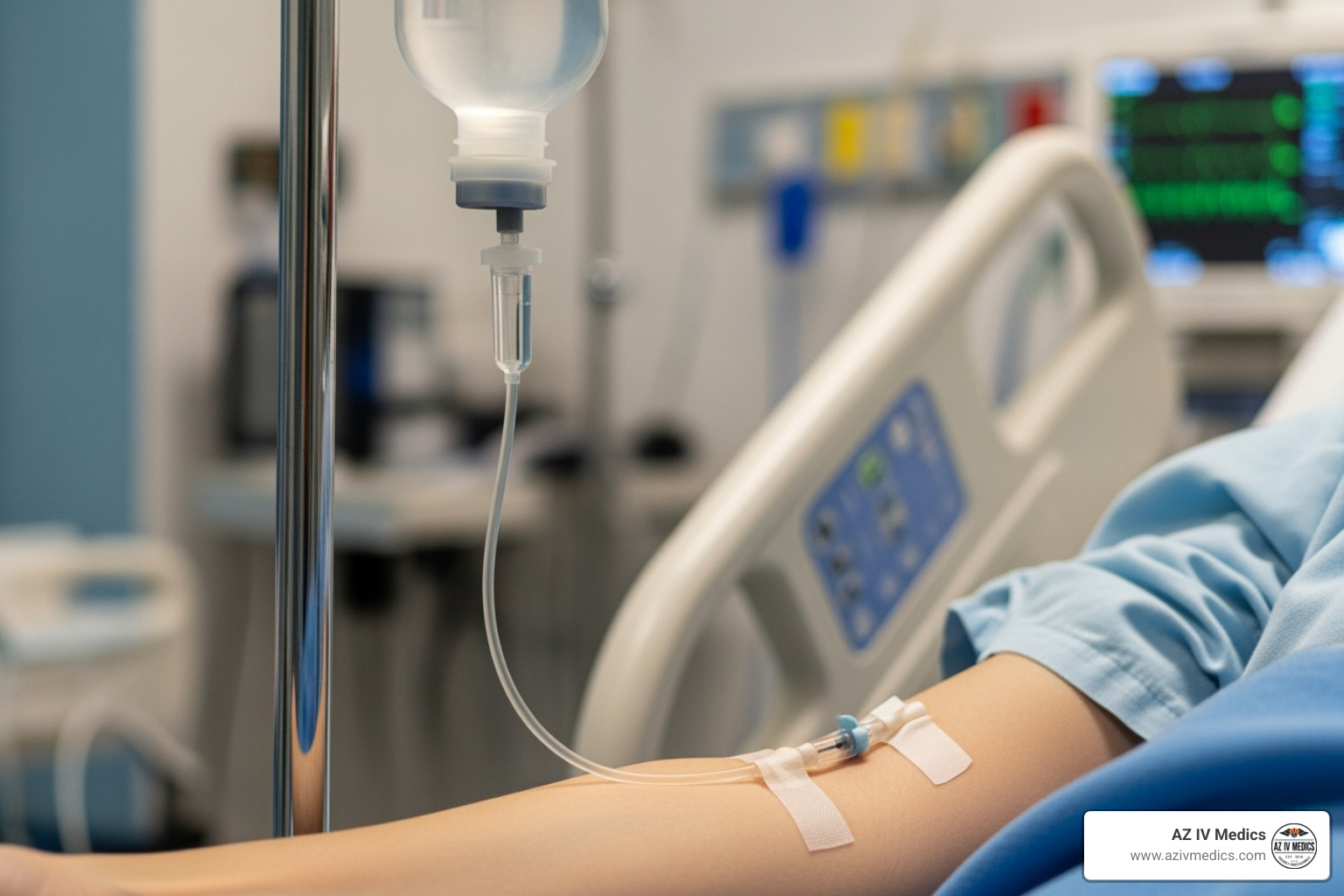
Common medical uses for IV hydration include:
- Severe Dehydration : From vomiting, diarrhea, or heatstroke, IV fluids rapidly restore balance when oral rehydration isn't enough.
- Malabsorption Syndromes : For conditions like Crohn's or celiac disease, IVs ensure patients get essential nutrients.
- Surgery : IVs maintain hydration and deliver medication before, during, and after procedures.
- Emergency Medicine : Used for rapid fluid resuscitation, blood transfusions, and life-saving medications.
- Rapid Medication Delivery : For infections or acute pain, IV medications work much faster than pills.
In these medical scenarios, the benefits of rapid delivery are essential. You can learn to spot the danger signs in our guide on Recognizing The Signs Of Severe Dehydration And How To Treat It.
The Rise of Wellness IV Hydration
Wellness-focused IV hydration has boomed in popularity, offered by mobile services and "drip bars" to improve well-being and relieve everyday ailments.
People seek IV hydration for:
- Hangovers : A popular use, IV drips quickly replenish fluids and electrolytes, often with anti-nausea medication, to combat hangover symptoms far faster than oral remedies.
- Athletic Performance and Recovery : Athletes use IVs to prepare for events and speed up recovery by restoring fluids and nutrients lost during intense activity. Learn more in our article, IV Hydration For Athletes: The Secret Sauce For Peak Performance.
- Jet Lag and Fatigue : IV drips with B-vitamins can provide a noticeable energy boost, helping to fight fatigue from travel, stress, or lack of sleep.
- Immune Support : Drips with high-dose Vitamin C and zinc are popular for boosting the immune system, especially during cold and flu season.
- General Wellness and Beauty : Many use IV therapy for overall health maintenance, detoxification, and to improve skin health by promoting cellular hydration.
The convenience of mobile services like AZ IV Medics, which bring treatments to your home, office, or hotel, makes wellness IVs an appealing option for busy people.
A Balanced Look: Benefits, Risks, and Medical Perspectives
While IV hydration offers exciting benefits, it's important to have a balanced view. As a medical procedure, it has both real benefits and potential risks, along with varied opinions from healthcare professionals. Understanding the full picture is key to making an informed decision about your health. To learn more about the revitalizing effects, see our guide on Replenish And Refresh With IV Hydration Vitamin Therapy.
Claimed Benefits of Wellness IV Drips
The benefits of IV hydration stem from its ability to bypass the digestive system for instant results. Key reported benefits include:
- Rapid Rehydration : IV therapy restores fluid balance in minutes, not hours, quickly alleviating symptoms of dehydration like headaches and dizziness.
- Increased Energy : IV drips with B-vitamins can provide a noticeable boost in energy, combating fatigue and mental fog.
- Hangover Relief : A combination of fluids, electrolytes, and anti-nausea medication can quickly turn a miserable hangover around.
- Immune Support : High doses of Vitamin C and other nutrients delivered via IV may provide a stronger boost to your immune system than oral supplements.
- Improved Skin Health : Proper hydration is key to skin elasticity and a clear complexion, and IV therapy provides hydration at the cellular level.
- Reduced Recovery Time : Athletes use IVs to rapidly replenish fluids and nutrients, helping to accelerate muscle recovery.
To learn more about fast rehydration, check out Hydrate Fast With IV Drips And Say Goodbye To Dehydration.
Potential Risks and Side Effects
IV hydration is an invasive procedure with some risks, though serious complications are rare when administered by qualified professionals.
- Infection : Any time the skin is broken, there's a risk of infection. Strict sterile technique is critical.
- Phlebitis (Vein Inflammation) : The vein can become irritated, causing temporary redness and discomfort. A more serious clot, thrombophlebitis, is rare.
- Infiltration : This occurs if fluid leaks into the surrounding tissue, causing swelling and pain.
- Fluid Overload : A risk for those with heart or kidney conditions, as too much fluid too quickly can be dangerous.
- Vitamin Toxicity or Electrolyte Imbalance : While rare with standard wellness drips, excessive doses or frequent treatments can cause imbalances.
- Allergic Reactions : Though uncommon, reactions to IV components are possible, highlighting the need for medical screening.
A systematic review of IV complications confirms that proper administration by licensed professionals is key to minimizing these risks.
What Do Doctors Say?
The medical community's view on wellness IV hydration is mixed. While its medical necessity is undisputed, opinions on elective drips vary.
- Lack of Research : A key concern is the limited scientific research supporting wellness claims like anti-aging or routine energy boosts in healthy people. Much of the evidence is anecdotal.
- Oral Hydration is Usually Enough : Most doctors agree that for healthy individuals, drinking water and eating a balanced diet is sufficient and more cost-effective for staying hydrated.
- Risks vs. Benefits : Some physicians argue that for healthy people, the potential risks of an invasive procedure may outweigh unproven wellness benefits.
However, the medical community universally agrees on the importance of qualified administrators . They stress that IV therapy is a medical procedure that must be performed by licensed professionals like Registered Nurses (RNs). The consensus is to be cautious, consult your primary doctor, and always choose a reputable provider with experienced medical staff.
Practical Considerations Before You Drip
Now that you understand the science, uses, and risks of IV hydration , let's cover the practical side: cost, alternatives, and choosing a safe provider. If you're in Arizona, our guide on How To Stay Hydrated With IV Therapy In Arizona can help.
Cost and Insurance Coverage
Wellness IV hydration is typically an out-of-pocket expense, as it's considered an elective treatment not covered by insurance. You should expect to pay the full cost upfront.
Costs can vary significantly, often ranging from $199 to $399 or more per session. The price depends on the specific blend of vitamins and nutrients in your drip, as well as your location. A basic hydration bag is less expensive than a premium cocktail. Unlike IV therapy in a hospital, which is billed to insurance, wellness drips are a direct cost to you. However, many find the convenience and immediate relief to be a worthwhile investment.
Safer and Effective Alternatives
Before choosing IV hydration , consider these effective alternatives for daily needs:
- Drinking Water : The gold standard for daily hydration. Sip consistently throughout the day.
- Electrolyte Beverages : Great for replacing salts and minerals after intense workouts or illness.
- Oral Rehydration Salts : Highly effective for treating mild to moderate dehydration, these packets are designed for maximum water absorption.
- Water-Rich Foods : Foods like watermelon, cucumbers, and oranges contribute to your overall hydration.
- Balanced Diet and Supplements : A healthy diet provides most necessary vitamins and minerals. Oral supplements can fill gaps, though with lower absorption than IVs.
- Adequate Rest : Sleep is crucial for recovery and energy. Often, fatigue can be addressed with better sleep habits.
Choosing a Reputable Provider
If you opt for IV hydration , your safety is paramount. Choosing the right provider is the most important step. Here’s what to look for:
- Licensed Medical Professionals : Insist on providers who use Registered Nurses (RNs) or Nurse Practitioners. At AZ IV Medics, all treatments are administered by experienced RNs.
- Thorough Medical Screening : A professional service will review your medical history, medications, and allergies to ensure IV therapy is safe for you.
- Sterile, Single-Use Equipment : All equipment, from needles to IV bags, must be new and sterile to prevent infection.
- Clean Environment : Whether in a clinic or via mobile service, the provider must adhere to medical-grade cleanliness standards.
- Emergency Protocols : A reputable provider will have clear protocols to handle any potential complications, such as allergic reactions.
- Transparency : Look for clear pricing, a full list of ingredients, and an honest discussion of potential risks.
Researching your provider ensures your IV hydration experience is both safe and effective.
Conclusion: Is IV Hydration Right for You?
So, should you try IV hydration ? The answer depends on your individual needs. It's a powerful tool for rapid delivery of fluids and nutrients, offering quick relief from hangovers, athletic fatigue, and general dehydration that traditional methods can't always match.
However, it is a medical procedure with risks, and for most daily needs, drinking water and a healthy diet suffice. IV hydration may be worth considering if you're dealing with significant dehydration, persistent fatigue, or need rapid recovery. The key is to be honest about your needs and consult a healthcare professional, especially if you have underlying health conditions.

For residents in Phoenix, Tucson, Scottsdale, Mesa, and Flagstaff, AZ IV Medics brings professional IV hydration to you. Our registered nurses deliver treatments in the comfort of your home, office, or hotel, with no travel fees or waiting rooms. It's convenient, professional care designed to help you feel your best.



